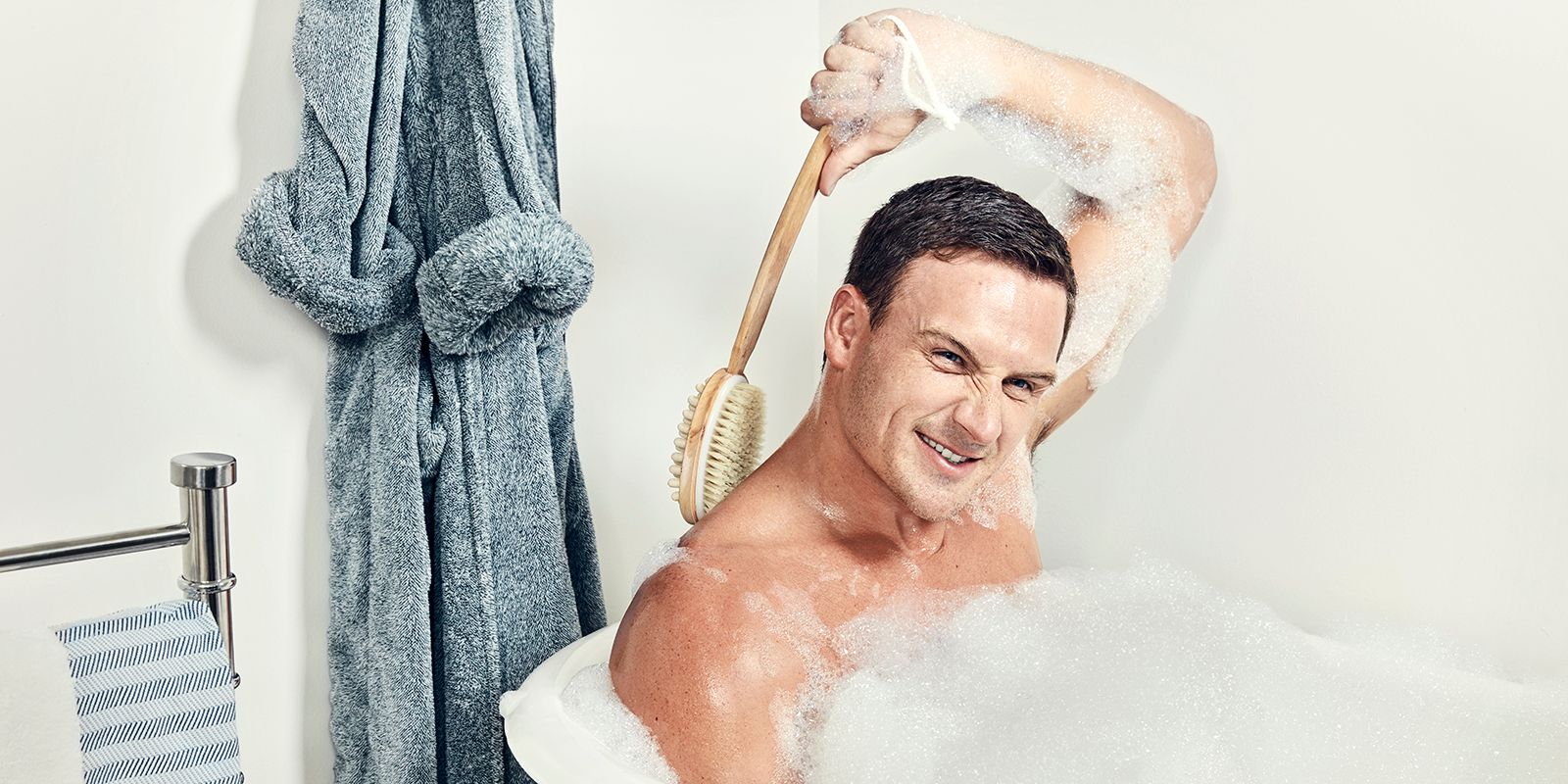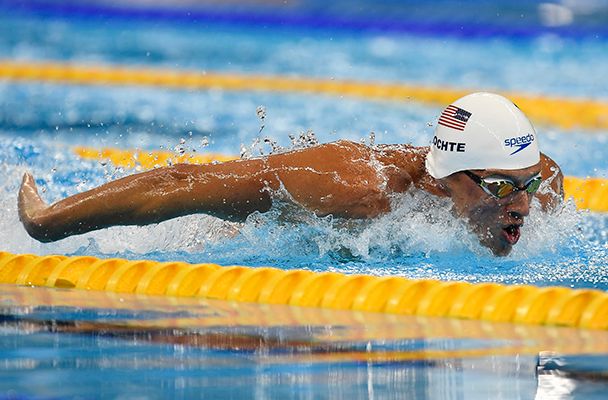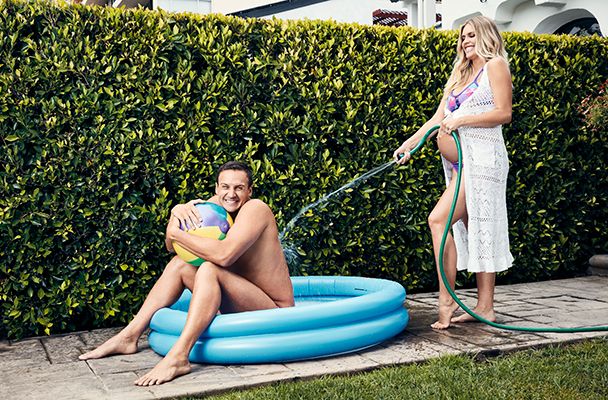
Do You Really Still Hate Ryan Lochte?
In consideration of fireworks, massages, Olympic gold, reality TV, marriage, fatherhood -- and that incident in Rio.
Ryan Lochte ranks No. 67 in the ESPN World Fame 100. This story about him appears in ESPN The Magazine's June 12 World Fame Issue. Subscribe today!
When Ryan Lochte enters Nail Paradise in Beverly Hills, the aestheticians rush him like pigeons to a loaf of bread. In no time his feet are soaking in a tub, one woman exfoliating his heels while another massages his shoulders under his T-shirt, working the lotion bottle with her elbow so as not to lose contact with his skin.
Lochte, 32, leans back, pleased. While most professional athletes get massages several times a week, they're unusual for him. Training or not, Lochte has never been the best at self-care, preferring instead to err on the side of fun, which for him means all manner of Florida backwoods tomfoolery, something Kyle Deery, his closest friend from childhood, describes as a "Hey, we've got 140 bottle rockets, you better start running" kind of thing.
Lochte says the last fireworks war happened this winter, and while he understands that blowing his fingers off would likely impede any future swimming aspirations, that understanding wasn't enough to deter him from chasing Deery around the yard as they launched lit explosives at each other.
"Man, I miss that guy," Lochte says, rolling his neck.
Lochte met Deery when they were both 12 and Deery had been ejected from swim practice for mouthing off. "Ryan came in, introduced himself and turned the punishment into a party," Deery fondly recounts. "He stopped me from sulking."
This was back when Lochte was a preternaturally gifted teen athlete, crushing multiple sports and making hay in the pines of Daytona, throwing rocks, surfing hurricanes, riding bicycles barefoot through the family home and into the pool.
"We had him tested," his father, Steve, recalls. Teachers suggested ADHD medication. But Steve had other ideas for channeling his son's energy. "We raced at everything. We would chug our milk to see who could drink the fastest. We'd see who could run and get the paper out of the mailbox first. I built in competitiveness."
Focus was a tougher row, says Steve, also his son's swim coach at the time. "Ryan was more interested in pulling on kids' legs, laying on the bottom of the pool and waving as they swam over." Sent to the showers as a reprimand, Lochte made mischief there too, plugging up the drains so he could skate on his butt across the tile flooring. Even so, "Ryan would go to the big meets and usually win."
"Ryan was all about racing," Steve continues. "He hated practice, but when I said, 'OK, we're going to do a time trial,' he'd be the first one on the starting blocks."
Then, at 13, Lochte narrowly lost a Junior Olympic Championship race to his friend Brent Arckey, and afterward, as he stared out the passenger window on State Road 40, watching the trees tick by in the Ocala National Forest, he arrived at a conclusion: Losing sucked.
"I said, 'Son, what are you going to do about it then?'" Steve remembers. Even now he can picture the unusually grave look on his child's face when he answered.
"I'm never going to let it happen again."
Largely, Lochte didn't. He's won six gold medals, 12 overall, which puts him second in the pantheon of Olympic swimmers, behind Michael Phelps and ahead of Mark Spitz. He holds multiple world records and-for better and worse-name recognition.
"Ryan and Michael made swimming for boys cool," says storied USC swim coach Dave Salo, who is working with Lochte toward a bid for 2020. "Swimming is grueling. It's mindless, it's boring. Ryan tries to put a face to the sport that at least is bearable and a little funny."
Salo also sees strategy behind the clowning: "Everybody knows Ryan, everybody has an opinion of Ryan. Everybody is talking about Ryan one way or the other. I think he's probably playing us all for fools a little bit."
The prospect of Lochte subversively masterminding a campaign for cultural relevance is one deeply at odds with a common public perception of him as a -- but not limited to -- grade-A doofus, poster child of white male privilege, irredeemable narcissist, "jeah" brah, Olympic Village idiot, guy who can't count to 11 unless he's naked, human vape pen, king of jock mountain.
In truth, Lochte probably isn't devoting his limited free hours to mastering the complex algorithms of image maintenance, a la Taylor Swift. But this is less because he is dim than because of the underappreciated fact that Lochte has never tried to pretend that he's someone he's not. He's the Jimmy Fallon of world-class athletes -- benign, thirsty for love, sporadically amusing and prone to spontaneous, ill-considered decisions that make him seem more callow than he actually is. Fame was never Lochte's goal, just the knotty byproduct of what his friends call "Ryan being Ryan." As Lochte explains: "My shoes with the teddy bears. My grill. That stuff was meant to lighten the mood. I mean, this world is so negative. If I can put a little bit of fun in people's lives, then I'm cool with that."
Lochte recognized early that most of life is lived outside the pool, his ambition rooted in personality, not medal count. "For Ryan, it's always more about not losing than winning," his father says. The avoidance of failure, rather than wrathful domination. (Avoidance is a theme in Lochte's life. "In practice, the coach will be yelling at a swimmer to change his stroke, and I will listen, observe and change it so that he'll never yell at me.")
Teammates and colleagues say Lochte is not a gloater, a BOOM-drop-the-mic guy. He wins, then he swims to celebrate everyone else. "He's always been patient, generous, even at practice," Salo says. "People are looking at Ryan as if he's a douchebag? I've seen him at a world championship give his gold medal to some random kid in the crowd. Michael never did that. I heard last month Ryan spent hours signing for Masters swimmers. I mean, my god, these are old people."
"I was that kid looking up to an Olympic swimmer," Lochte explains, describing a formative encounter when he asked an idol for an autograph in a hotel elevator and was disdainfully refused. "I went back upstairs, crying, and told my dad, 'If I'm ever in that position, I'll never say no.'"
Lochte has kept his word. He says no to very little. He picks up tabs, shares his sandwiches. He goes along to get along, eats at restaurants he doesn't like, gives away his things -- electronics, clothes, awards -- when people in his life admire or covet said things. In college, at the University of Florida, Lochte used his medal money to buy tricked-out car stereos for his friends, installing them over the weekend as a surprise. By all accounts, he is ride or die, as you wish, boundaryless to the point of concern.
"It goes back to me always wanting to make everyone happy," Lochte says. "At a bar, I'll buy shots for the entire place. I can't change it, as much as I want to." (On a related note, Lochte says he's never been to therapy.)
Lochte knows his urge to be "that guy" makes him an easy mark. "It's his Achilles' heel," says teammate Cullen Jones of Lochte's compulsive people-pleasing. "He loves hard, to a fault. When people get around him, they never want to leave. Anyone who has spent time with him literally wants to protect him."
There are also moments, Lochte reveals, when he wishes "the fame and everything I've gotten had never happened."
"I was a really good basketball player," he says wistfully. "But my love for the water was unbreakable. I step in, everything disappears. Sometimes I wish I could stay underwater forever."
Lochte says his fiancee, Kayla Rae Reid, and baby (due in June) have given him new purpose. Emily Shur For ESPN
The Beverly Hills Hotel Cabana Cafe is rarely short on celebrity. Even so, the poolside diners crane their necks to stare as Lochte slinks by, toes turned inward in his bleach-white Vans, an equally white tee showcasing his SPF-be-damned sunburn. He slides into a corner banquette beside his fiancée, Playboy model Kayla Rae Reid, in full makeup and lashes, a roomy sweater draped over her pregnant belly, which Lochte pats absently.
"We want him to speak a second language," Lochte says of his son, due in June. "Probably Spanish," as a nod to Lochte's Cuban mother, Ileana.
After ordering a salad and a Coke, Lochte begins to open up about the Rio fallout for the first time, his right knee jackhammering wildly underneath the table.
"You can be at the all-time high and then the next second the all-time low," he says ruefully. "I love being at the Olympics, but I'm the opposite of what you'd expect. It's been that way my whole life. I don't fit in."
Reid is more direct, arguing that Olympic athletes aren't allowed to be playful, or messy, or real-that they're released every four years like fireworks, glorious to behold, swooned over in the moment, then largely forgotten until the next special occasion. (As Jones explained, when shite goes pear-shaped, "it's not like next week you can throw up 40 points and have everyone love you again.")
In Rio, the pear-shaping started when Lochte and swimmers Gunnar Bentz, Jack Conger and James Feigen made a pit stop and relieved themselves in a filling station hedge. Lochte, per statements from his teammates, also pulled a framed advertisement to the ground. Surveillance video showed the swimmers detained by armed officials who demanded money for the damages before letting them depart in their cab. The men paid and returned to the Olympic Village, where the incident would have been quickly forgotten had Lochte not exaggerated the retelling to his mom, who in turn shared with the media that her superstar son had been robbed at gunpoint. Lochte then repeated his early exaggerations on camera to the Today show, and an international scandal was born.
The actual sins of the swimmers were well below average on the pearl-clutching scale. Many professional athletes have been excused for much darker behavior (see: Michael Vick, Adrian Peterson, Phelps drunk-driving charge), as have other public figures. Brian Williams lied and exaggerated about his heroism in wars, and he has his own news program. Robert Downey Jr. went from dope fiend to Iron Man. Even drunk-driving bigot Mel Gibson is getting fresh love because he made a decent movie last year.
"People wanted a reason to hate me," Lochte says about his crimes and misdemeanors. And he gave them one: His initial deceptions, combined with his feeding of racially based perceptions of crime, generated a perfect storm of global righteous indignation, all directed tsunami-style at Lochte.
"Everything was blown out of proportion," Reid says, stabbing at a forkful of lettuce.
Were you completely hammered?
"Oh, we were, yeah," Lochte says sheepishly. "And that's why-"
"They were celebrating their victory," Reid interjects. "At the time, I really had to sew my mouth shut." She shakes her head, cheeks flushed. "People treated him like he murdered somebody."
When Lochte arrived home in Charlotte (on what he says was a prescheduled flight), there were a dozen media vans outside his house. He watched the news, read the online comments, the searing articles outlining how "Ryan Lochte Is the Worst!" In days, he lost every sponsor. He also received death threats. At a public appearance, Reid had a glass thrown at her head.

Lochte's Olympic medal count puts him second all time among U.S. swimmers, behind Michael Phelps and ahead of Mark Spitz. Martin Meissner/AP Photo
"After Rio, I was probably the most hated person in the world," Lochte mumbles. "There were a couple of points where I was crying, thinking, 'If I go to bed and never wake up, fine.'" Asked if that means he considered suicide, Lochte nods slowly. "I was about to hang up my entire life."
Reid's jaw stiffens. She strokes Lochte's shoulder, eyes narrowed with concern. He takes a deep breath, looks around the pool at the diners blithely snacking on fruit salads and cheeseburgers. After a beat, he forces a smile.
"Everything happens for a reason," he offers with moderate conviction. "Look, I was done with swimming back in 2013. I was drained, wiped out. Now I've found a new purpose with my son. This fire has been ignited, and it's bigger than ever, and I'm just so excited because I know what's going to happen in Tokyo. Everyone is going to have to watch out!"
Lochte starts giggling, a little embarrassed. Reid says no one should underestimate her man, even though he will turn 36 in 2020. Lochte is visibly grateful for her belief in him, and the conversation shifts to how they met in January of last year, a whirlwind courtship in which their first date was an unanticipated seven-hour heart-to-heart on a couch, a chaste and illuminating turn of events that left them both convinced they'd found "the one."
"I wasn't interested in him at first," Reid shares. "I'd heard he was a party guy. He was so different than what I imagined."
Lochte had his own epiphany.
"You know when you meet someone for the first time and you have your guard up and don't want to be too intimate about certain things?" he asks rhetorically. "I didn't have my guard up. It was like talking with my best friend."
Lochte has wanted a family for years, he says. He's been lonely. Exhausted. And now that he's found his person, he is devoted in a way that would make Hallmark envious. He proposed by flying his intended to a beachside cliff via helicopter, a table with champagne and roses set below, a photographer hired and hiding in the brush. Reid suspected something was up when she held Lochte's hand in flight and it was clammy.
The notion of Lochte planning and executing every detail of a complicated, cinematic proposal is one most casual observers would find surprising, another presumption that "bothers" Reid, who admits that she has never watched her fiancé's short-lived reality show -- What Would Ryan Lochte Do? -- and likely never will. "It's fake," she says flatly.
"They had me drinking nonstop," recalls Lochte. "Eight in the morning, a drink in my hand. I'm like, my liver is about to fail," he says, laughing. "And anything I said, they'd say, 'All right, let's do this scene over, and Ryan, say it like this.'" (Producers did not respond to our request for comment.) Lochte shrugs. "Not many people can say they had their own TV show," he says, sneaking a single french fry off Reid's plate and popping it in his mouth.
"You watch from afar and you're like, why are you doing this?" says coach Salo, before adding: "But you can probably name three swimmers, maybe four. They've got a short window to distinguish themselves. Somebody's got to pay the bills."
According to Jones, the price Lochte paid for that visibility was steep. "Everyone thinks he's an idiot, and he's not. Far from it. The way people approach him? If they came at me that way, I'd be very upset, I'd feel disrespected. And Ryan being Ryan, he's just, 'Cullen, chill, its fine.'" Jones pauses, sighs. "I think it bothers him more than he lets on, but trust me, he will never let on."

Reid had no interest in Lochte when she first met him, but after their first date, she was sure he was "the one." Emily Shur For ESPN
There's no trophy case in the current Lochte rental house. No photographs with presidents, no framed clippings, not one piece of evidence that Lochte is the second-most decorated swimmer of all time. Instead, there is a vintage framed portrait of Marilyn Monroe in a tutu; a white, wooded letter L propped beside a tasteful vase of lilies; more white pillar candles than in Mariah Carey's dressing room. The general aesthetic is soft, minimal. The one personal photograph on the wall is a 5-by-7 of the happy couple at the moment of their engagement; beneath it, a bookshelf holding a hardcover of Tony Robbins' Awaken the Giant Within; on the coffee table, a Dr. Spock baby guide and the Playboy 2017 calendar.
Upstairs, the nursery is a study in blue and gray, a car seat still wrapped in cellophane, breast pump on the dresser in its box, all tidy, ready to go.
"Ryan is super clean," says Jones, who has roomed with him since they became friends at the 2005 world championships. "He'll repack his bag seven times, refolding everything."
Over lunch at a café on Wilshire Boulevard, wearing his favorite Vans and a dress shirt that strains at the buttons, Lochte talks about his night, how he spent much-needed couch time alone, catching up on Big Little Lies and Chrisley Knows Best. On the whole, he prefers films to TV.
"My favorite movie is What Women Want," he says. "I could watch that on loop all day." Lochte posits that he'd "rule the world" if he knew what women were thinking, then confides that he and Reid had a tough talk the day before. She wants him to share more, "but I don't want to tell my s--- to people. It's not that I don't want to change. It's just ..." Lochte falls quiet, aware this isn't necessarily a prudent long-term strategy for marriage.
Lochte's parents divorced in 2011, the split a shock. For the first time in Lochte's life, his dad "drifted away."
"I was the daddy's boy, the favorite," Lochte says. "When I was born, my dad told the family, 'Now the Lochte name will live on.'"
Steve Lochte wasn't big on praise. "'Great' to me, Ryan, is when a swimmer can break the world record and win the individual gold on the same day," he'd say.
In Beijing in 2008, Lochte did just that. In footage after the win, you can watch as he scrambles up the bleachers into his father's arms, pressing against the railing, where Steve whispered in his son's ear the words Ryan had longed to hear his whole life: "Today you're great."
Steve did not attend the Rio Olympics. Lochte rejects any suggestion that a rift with his father contributed to the Rio debacle. "Of course I'm sad about it. I so wish he were there. I wish he was there every day of my life, but when it's time for me to do my job, it's time for me to do my job."
As for the antics that followed doing the job, Lochte claims he knows better now. "You learn from your mistakes," he says. "Am I going to be perfect? No."
He points to a hatch of scars across his knuckles, evidence of youthful scraps. "My first fight I got knocked down. I was so scared before that. But then I realized I wasn't made of glass. I could get back up."
Lunch done, Lochte walks cheerfully down the street. When recognized, he poses for photos, smiles, pushes his chin toward the lens. "Honestly? To this day, if someone comes up and says they want a picture or an autograph, I'm like, for real? Me?"
He talks about the Olympics, how he hates being so isolated. He prefers cutting up with his friends, communing with the fans, craving the chance to make someone, anyone, happy.
He decides to share a secret about his time there, when cameras from hundreds of nations are trained on his every wink and nod.
"When you see me on TV wearing headphones by the pool?" he whispers, blue eyes twinkling conspiratorially. "There isn't any music playing."



